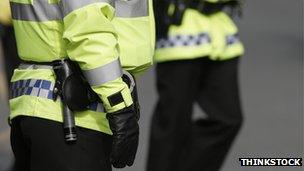Inside a knifepoint mugging
- Published

People read thousands of newspaper headlines about crime and policing, but an experience like a knifepoint mugging allows you to truly see the system at work.
He came from the darkness behind me. "Mate?"
I spotted the knife straight away. Down to his side, but not hidden. He was masked and hooded, but calm and confident.
"Give me your phone."
After 19 years of crime-free living in London, I was finally the victim of a mugging. In my own neighbourhood. Breathlessly, I did the right thing and handed over my iPhone and wallet, desperately trying not to raise the temperature of the encounter.
"Don't call the police," he said walking off. "I've got a mate watching where you live."
As I rushed to my house, these words left me standing for half a minute outside the front door, thinking hard about whether I was putting my wife and children at risk by going in and dialling 999. I decided he had to be bluffing.
Being mugged at knifepoint has affected me in several ways. Yes, it was disturbing. But as someone whose job it is to cover the police and the justice system, being a victim within that system was about to provide me with invaluable experience of how it works - from the inside.
And that night there was an extraordinary coincidence. I had just come from Scotland Yard where I'd been finishing off a BBC Ten O'Clock News report on the Winsor Review of police pay and conditions. The review had concluded that officers should be fitter.
I was about to be given a demonstration, before my very eyes, of how important that is.
The three-person unmarked car from Haringey's Robbery Squad arrived within 10 minutes. I climbed in and we searched the streets of north London for the robber.
Pulling up in an estate in Crouch End, north London, the officers tried to stop and search two lads who had form for mugging. One resisted and for 10 minutes berated the police, who tried to talk him down before reluctantly cuffing him.
Far from solving my mugging, now they had another incident to deal with.
I was in the back of the police car staring dumbly at a brand new iPad. They'd been given it just that day, and I was seeing whether I could trace my phone using the Find My iPhone app. To my astonishment, at that moment its location appeared on the map.
Modern policing lesson number one: it's all about priorities. The rowdy lads were abandoned and we set off through the streets at high speed in an attempt to get to the estate where my phone seemed to be.
There were two more figures standing on a street corner as we arrived. One looked familiar. "That could be him," I said to the police.
The boys stared at our car for a second and legged it.

Are we too quick to write many police off as unfit?
In his review of policing, Tom Winsor concluded: "The public may be surprised to learn that once an officer has passed his probation, he may never be subject to any test of his physical fitness." Elsewhere his report suggested too many officers were just a bit overweight.
Not the 20-something plain clothes officer sitting in the front seat of the car. He was out of the door in seconds, and quickly up to 100m sprint pace. The youth he was chasing disappeared into the darkened estate, the officer close behind.
Could it be that police officers in general might have a tendency to heaviness (don't we all), but that those who need to be match-fit, make sure they are?
Well maybe, but there's no denying that any officer might have to give chase at any time.
This pursuit, I'm told, was dramatic. Over walls and fences. Across a roof. An arrest was made.
But that night reinforced another lesson about modern crime and policing. A major and growing challenge to the bad guys is technology.
My phone, pumping out its GPS location periodically over the internet, was found nearby.
The police are keen to publicise the success they're having with apps such as Find My iPhone [or alternatives like iLocalis, Device Locator and GadgetTrak], which must be enabled by the user, in advance of being mugged. Thankfully, being a bit of a geek, I had done just this.
Clearly criminals will start to realise they can be tracked. But maybe stealing a mobile phone will one day become as hard as stealing a modern car. With their sophisticated alarms, intrusion detectors, and rotating key-codes, these days thieves often resort to burgling houses to get car keys.
But beyond that, our movements through the modern world are so comprehensively recorded that it must be getting harder to commit crime.
It's not just CCTV, which, in my case, proved the mugger had been in my neighbourhood when he insisted he hadn't. My detective used the suspect's Oyster travel card to track his movements by bus across north London.
This twin-pronged evidence skewered my mugger's case, resulting in him pleading guilty at the last minute, as I waited nervously to give evidence.
As a result, I was spared the tension of having my story questioned by a defence barrister. And I got to see how it often takes the threat of a trial to force someone to admit their guilt.
There couldn't have been a trial without a witness, and if I hadn't turned up (many don't), he would have got away with it. It was interesting to see how important this last minute show of hands by defence and prosecution can be.
Sentencing will take place in August, but being guilty of a knifepoint robbery, at night, with a mask on, will result in a jail term of at least three and possibly five years. He is just 19.
The judge is even considering a sentence that requires him to prove he is not a danger, before being released. It is called an "indeterminate sentence".
Why? Well, 14 days before our meeting he had been released from prison. He'd been serving a sentence for mugging someone, with a knife. Just two streets from mine.
The BBC News Magazine asks: will we ever reach the point where things become unstealable?
Readers share their readers' experiences of being mugged.